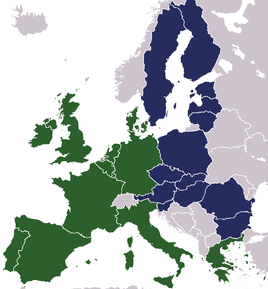Reading and analyzing text: Political Alliances in the European Union
Design Guide
Designers for Learning - Adult Learning Zone
Table of Contents
Learner Audience / Primary Users
College & Career Readiness Standards (CCRS) Alignment
Instructional Strategies and Activities
Presentation / Modeling / Demonstration
Part 3: Supplementary Resources & References
Part 1: Lesson Description
Lesson Title
Reading and Analysing text in the context of European Political Alliances
Abstract
This lesson is designed for adult learners at an education grade level E. The purpose of the lesson is to develop learner proficiency in reading and analysing text.The lesson topic is the issue political alliances in creation of the European Union.
Learner Audience / Primary Users
Adult basic education students, grade level E who are working toward GED testing for the subject of Enlish Language arts/literacy, reading of informational text. And for teachers.
Educational Use
- Curriculum / Instruction
College & Career Readiness Standards (CCRS) Alignment
- Level: Adult Education
- Grade Level: Grade Level E
- Subject: English Language Arts / Literacy
- Strand: Reading
- Standard Description:
- Ccr anchor standard 1: Read closely to determine what the text says and to make logical inference from it. Cite parts of the text in conclusion
- RI/RL 9-10.1 Cite strong and thorough textual evidence to support analysis of what the text says explicitly as well as inferences drawn from the text.
- CCR Anchor Standard 2 : Determine the central ideas or themes of a text and analyze their development; summarize the key supporting details and ideas
- RI/RL 9-10.2 : Determine a theme or central idea of a text and analyze in detail its development over the course of the text, including how it emerges and is shaped and refined by specific details; provide an objective summary of the text
Language
English
Material Type
- Instructional Material
Learning Goals
The purpose of this lesson is for learners to be able to:
- To read and analyse text and examine a main theme
- To summarise key details, citing evidence to support analysis
Keywords
- Designers for Learning
- Adult Education
- RI/RL 9-10.1
- English Language Arts/Literacy
- Reading and analysing text
- European Union
- Political Alliance
Time Required for Lesson
15-30 mins
Prior Knowledge
Ability to read at Grade Level E
Basic knowledge of internet searches
Required Resources
Access to internet.
Lesson Author & License
- Lesson Author: Christian Lee
- License: [Type Creative Commons License; Creative Commons CC BY 4.0 license is requested]
Part 2: Lesson
Learning Objectives
By the end of this lesson, the learner should be able to:
- Read and analyse text and extract the main theme, discuss this in groups and and answer text based questions
- Summarize three key points
Lesson Topics
Key topics covered in this lesson include:
- Political Alliance for the creation of the European Union
Context Summary
This lesson will develop learners’ reading skills and analysis of text and communication of their inferences drawn from discussion and reflection. The lesson outline is how politicians allied to create the European Union.
Relevance to Practice
Reading and analysis of text is important for participation in civic life and for this lesson making one’s own political decisions. Listen to the opinions of others and reason their own opinions in discussion.
Key Terms and Concepts
Discussion- from evidence cited from reading the text
Evidence- extract information from the text and answer written questions.
Politics- the activities associated with the governance of a country or area, especially the debate between parties having power.
Alliance - a union or association formed for mutual benefit, especially between countries or organizations
Opinion - a view or judgement formed about something, not necessarily based on fact or knowledge.
Instructional Strategies and Activities
Warm-Up
Time: 3 minutes
Teacher to describe what a political alliance is. Students then are to brainstorm what the benefits are of political alliances.
Teacher to bullet point on a board the results (with guidance) from the brainstorming.
Introduction
Time: 5 minutes
Teacher is to describe the lesson purpose. To read and analyse text to gain an understanding of an issue. To communicate and discuss the outcomes of political unions. To start discussion watch a YouTube ‘A brief history of the European Union
Presentation / Modeling / Demonstration
Watch a You Tube video: A brief history of the European union
Time: 5 minutes
Teacher writes the lesson topic on a board to discuss and explore
- Why was the European Union started?
- What implications did it have for member states?
Guided Practice
Time: 10 minutes
Text based discovery: students will read a Wikipedia article ‘Copenhagen criteria’ link below and answer these questions in groups:
Web reading or print to be used
https://en.wikipedia.org/wiki/Copenhagen_criteria
- What are the 3 main requirements for entry into the union?
- What criteria lies outside the Copenhagen agreement
- What criticism did Romania and Bulgaria face on entrance to the union?
Evaluation
Time: 5 minutes
Students in pairs to present findings using presentations via text, oral or visual methods
Application
Time: 3 minutes
Homework to be handed back in to teacher:
Written questions on paper for students to answer
List 3 examples of alliances / allies in everyday life that are current or historical
Answers can be textual and/or graphical
Part 3: Supplementary Resources & References
Supplementary Resources
Members of the European Parliament (19 May 1998). "Legal questions of enlargement". Enlargement of the European Union. The European Parliament. Retrieved 2008-07-09
References
[Type your reference list here.]
Attribution Statements
“The You Tube Video Abrief history of the European Union was created by Epin Uk of for and published athttps://www.youtube.com/watch?v=XgnXwrsMBUs
. This [audio/video] is copyrighted
and is not licensed under an open license. Embedded as permitted by Standard YouTube License
This course content is offered by Designers for Learning under a CC Attribution license.
Content in this course can be considered under this license unless otherwise noted. Page
(Design Guide effective March 29, 2016)
